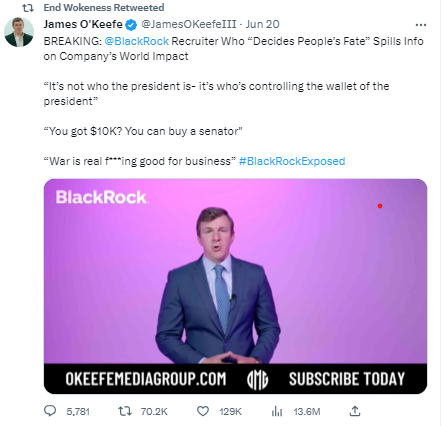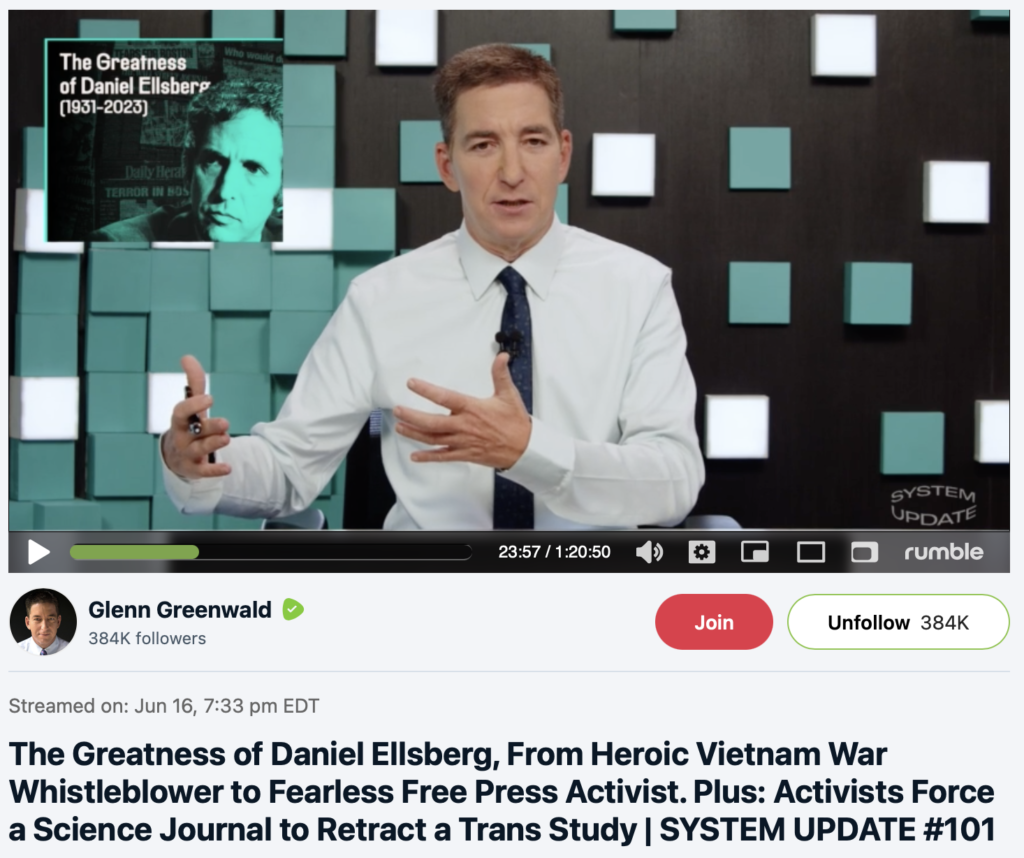On June 4, 2023, two weeks before he died, Daniel Ellsberg gave one final interview at Politico. Michael Hirsh's interview appears in an article titled: "Daniel Ellsberg Is Dying. And He Has Some Final Things to Say: The iconic whistleblower reflects on the urgent need for others to follow in his footsteps."
I have the greatest admiration for Daniel Ellsberg's bravery and his patriotism as a whistle-blower. I am writing this post to share some of his final thoughts, which I consider to be critically important in this era of increasing societal willingness to tolerate both corruption of own's own tribe and overall government censorship. But first, a few thoughts about whistle-blowers.
A lot of people are uneasy with whistle-blowers--they think of them as law-breakers, which is true. But what else are you supposed to do when you are a government employee who has a front-row seat to corruption in your own office? I admit that I feel more passion for the plight of whistle-blowers than many people because I was one. In the late 1980s, I became an anonymous source for various newspaper articles in the St. Louis Post-Dispatch reporting the corruption of Missouri Attorney General, William Webster. See also here.
I understand the hesitation that many people initially have for supporting whistle-blowers, because they are law-breakers. We have laws that put whistle-blowers at financial and criminal risk for exposing corruption, which usually (as in my case) requires revealing internal documents to prove that corruption. The choice might seem daunting from the outside, but it becomes stark for whistle-blowers: Would you rather stay quiet, thereby acceding to government corruption? Or will you break laws, risk getting fired (which I was) and risk losing both your liberty and your means to pay your bills, all for the higher purpose of letting fellow citizens know that they are being betrayed by their elected officials? If your reputation is important to you, the choice becomes easier. And as one of my confidants told me back in the 80's, "You will need to look in the mirror at yourself every morning for the rest of your life. What kind of person do you want to see?"
For many whistle-blowers, including Daniel Ellsberg, there is no choice at all. He needed to expose the corruption because so much was at stake. He chose to become a whistle-blower in an especially dramatic and dangerous way. He did it to stop the tragic farce we refer to as "the Vietnam War," where 50,000 Americans and hundreds of thousands of Vietnamese people were being slaughtered based upon an initial big lie (the purported Gulf of Tonkin incident) and subsequent non-stop lies spewed by the U.S. government that the Vietnam War was winnable. Contrary to these lies, secret internal U.S. communications made it absolutely clear that, for a variety of reasons, the U.S. would never prevail militarily.
The entire Politico article is well worth reading. Here are a few of Ellsberg's last thoughts that I'd like to share:
“The need for whistleblowing in my area of so-called national security is that we have a secret foreign policy, which has been very successfully kept secret and essentially mythical,” [Ellsberg] says. “I’m saying there’s never been more need for whistleblowers … There’s always been a need for many more than we have. At the same time, it’s become more and more dangerous to be a whistleblower. There’s little doubt about that.” . . .
During the course of our hour- and-20-minute interview, Ellsberg contended America still runs a “covert empire” around the world, embodied in the U.S. domination of NATO. He believes Washington deliberately provoked Vladimir Putin into invading Ukraine by pushing its seat of power eastward toward Russia’s borders; that the mainstream media is “complicit” in allowing the government to keep secrets it has no right to withhold; and that any notion Americans are ever the “good guys” abroad “has always been false.”
“I think very few Americans are aware of what our actual influence in the former colonial world has been, and that is to keep it colonial,” Ellsberg says. “King Charles III [of Britain] is no longer an emperor, as I understand it, but for all practical purposes Joe Biden is … Here’s a point I haven’t made to anyone but would like to in my last days here. Very simply, how many Americans would know any one of the following cases, let alone three or four of them?” Ellsberg then rattles off a series of U.S. orchestrated coups, most of them fairly well documented, starting with Iran in 1953, and then in Guatemala, Indonesia, Honduras, Dominican Republic, Brazil and Chile.
I respond by saying those were all Cold War policies, if covert ones, and ask him whether he thinks anything has changed since. In announcing the complete U.S. withdrawal from Afghanistan in 2021, for example — as the Taliban effectively chased American troops out of the country — Biden declared that the United States was “ending an era of major military operations to remake other countries.”
Ellsberg doesn’t believe it. “Democrats in this area are as shameless as Republicans,” he says. “Our elections in the realm of foreign policy and defense policy and arms sales, I have come to understand, are essentially between people vying to be manager of the empire.”


